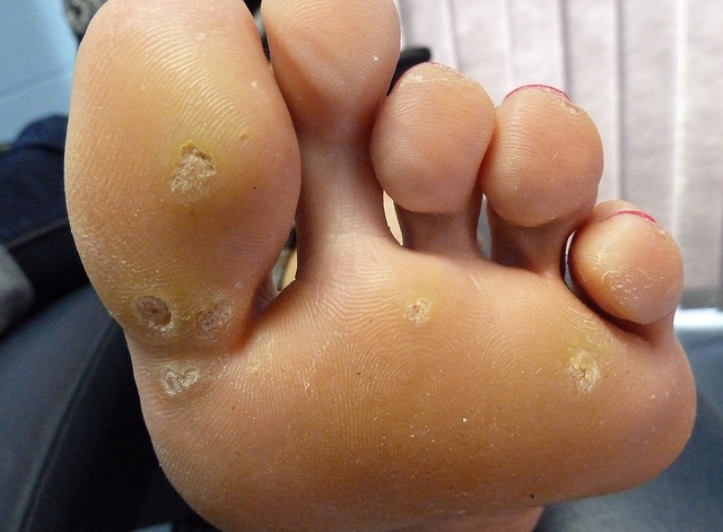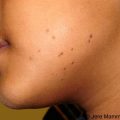
Plantar warts are small growths that usually appear on the heels or other weight-bearing areas of your feet. This pressure may also cause plantar warts to grow inward beneath a hard, thick layer of skin (callus).
Plantar warts are caused by HPV. The virus enters your body through tiny cuts, breaks or other weak spots on the bottom of your feet.
Most plantar warts aren’t a serious health concern and usually go away without treatment eventually. You may want to try self-care treatments or see your doctor to have the warts removed.
What are the symptoms of plantar warts?
Plantar wart signs and symptoms include:
- A small, fleshy, rough, grainy growth (lesion) on the bottom of your foot, usually the base of the toes and forefoot or the heel
- Hard, thickened skin (callus) over a well-defined “spot” on the skin, where a wart has grown inward
- Black pinpoints, which are commonly called wart seeds but are actually small, clotted blood vessels
- A lesion that interrupts the normal lines and ridges in the skin of your foot
- Pain or tenderness when walking or standing.
Are Plantar Warts Contagious?
According to Mayo Clinic, the HPV strains that cause plantar warts aren’t highly contagious. So the virus isn’t easily transmitted by direct contact from one person to another. But it thrives in warm, moist environments. Consequently, you may contract the virus by walking barefoot around swimming pools or locker rooms.
Warts are spread easily. You can infect yourself again by touching the wart and then touching another part of your body. You also can infect others by sharing towels, razors, or other personal items.
How to treat plantar warts
Most plantar warts do not need treatment. But if warts cause you pain or spread, your doctor may recommend that you use an over-the-counter treatment. These include salicylic acid, duct tape, and freezing sprays. Your doctor may prescribe a stronger medicine to put on warts or may inject them with medicine. Your doctor also can remove warts through surgery or by freezing them.
Follow-up care is a key part of your treatment and safety. Be sure to make and go to all appointments, and call your doctor or nurse call line if you are having problems. It’s also a good idea to know your test results and keep a list of the medicines you take.
How can you care for yourself at home?
- Use salicylic acid or duct tape as your doctor directs. You put the medicine or the tape on a wart for a while and then file down the dead skin on the wart. You use the salicylic acid treatment for 2 to 3 months or the tape for 1 to 2 months.
- If your doctor prescribes medicine to put on warts, use it exactly as prescribed. Call your doctor or nurse call line if you think you are having a problem with your medicine.
- Wear comfortable shoes and socks. Avoid high heels or shoes that put a lot of pressure on your foot.
- Pad the wart with doughnut-shaped felt or a moleskin patch. You can buy these at a drugstore. Put the pad around the plantar wart so that it relieves pressure on the wart. You also can place pads or cushions in your shoes to make walking more comfortable.
- Take an over-the-counter medicine, such as acetaminophen (Tylenol), ibuprofen (Advil, Motrin), or naproxen (Aleve) if you have pain. Read and follow all instructions on the label.
- Do not take two or more pain medicines at the same time unless the doctor told you to. Many pain medicines have acetaminophen, which is Tylenol. Too much acetaminophen (Tylenol) can be harmful.





